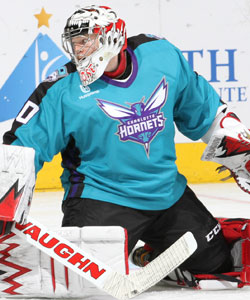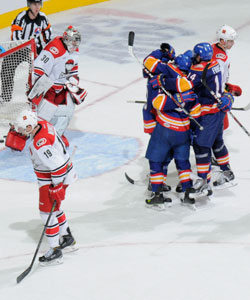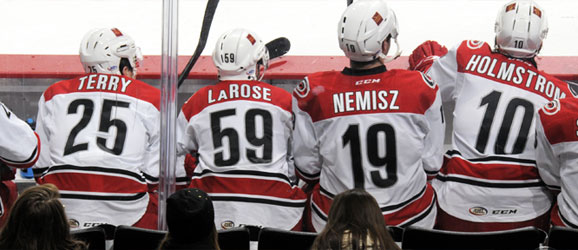It wasn’t necessarily the fact that the Checkers lost a 2-0 lead with 2:08 remaining in the third period, even going so far as to give up a would-be regulation winner that officials correctly disallowed as offside, although that’s certainly something they won’t hope to repeat any time soon.
For coach Jeff Daniels, what stood out was his team’s work ethic as compared to every other game this season. Even though the team hasn’t won as often as it would have liked through two months, that had never been a question until Tuesday.
“When we were losing some of those games I thought the effort was there and I thought we deserved better than the results we were getting,” said Daniels. “In the Norfolk game they out-worked us and for me they deserved to win. It was the first time I can really look back and say I was disappointed in the effort and the way we worked.”
There are a few potential reasons for the setback. One is that the team was playing its third game in four days, even though all three were at home. If fatigue was an issue, it should be rectified with three days off between that game and Saturday’s matchup with Iowa, also at home.
Another is that the team was coming off its most successful stretch of the campaign – consecutive victories against the formidable Milwaukee Admirals that marked its first winning streak of the season. It’s possible that whatever desperation had fueled the Checkers into battling their way through each game had subsided somewhat as confidence grew.
“You win two and you score in the first 25 seconds of (Tuesday’s) game and you think you’re better than you are and it’ll be easy,” said Daniels. “That plays into it.”
The disappointment of getting one point instead of two on Tuesday aside, the Checkers enter the weekend with points in each of their last three games (2-0-1) and points in each of their last five home games (4-0-1) – both of which are season-long streaks.
Some other news and notes from this week:
GOALIE ROTATION

After starting just two of the Checkers’ first 13 games, Muse has entered more of an even rotation with veteran Drew MacIntyre. The two have evenly alternated starts ever since Muse’s first victory of the season on Nov. 18.
Asked if that was merely due to the increasingly condensed nature of the schedule – breaks like the current three-day hiatus are quickly becoming a luxury rather than the norm – Daniels also hinted that the change was based on merit.
“Mac was outstanding on Sunday (39 saves in the 3-2 shootout victory) but I thought Muser battled hard on Saturday and stuck up for a teammate,” said Daniels, referring both to the game and the third-period altercation that led to his fight with Milwaukee counterpart Magnus Hellberg and both goaltenders’ ejection from the game. “In the previous game in OK City he was also really good for us. With four games in seven days it was a chance to get both of them in because we’re confident in both guys. They both give us a chance to win and goaltending was definitely not an issue over the weekend.”
The incident in question occurred on Saturday when Milwaukee’s Michael Liambas continued to punch Checkers defenseman Rasmus Rissanen even though the latter had fallen to the ice right in front of Muse. Muse intervened, causing Hellberg to race across the blue lines and engage.
“Obviously you don’t want to see your goalie get tossed out and in a fight, but at the same time it was a situation where Riss was kind of in trouble a little bit and Muser just tried to get in there to help him out,” said Daniels. “For me that’s a sign of a good teammate.”
POWER-PLAY PERFORMANCE

They finished the game 0-for-5, with all but one of those chances coming in the final frame. During the third, they had 38 seconds of a two-man advantage and four consecutive minutes to work with when the Admirals’ Dave Steckel drew blood on a high stick with 7:07 to play.
“The power play for me was the big turning point and really let us down there,” said Daniels. “You get a third goal and a good chance the game’s over, but it gave them some momentum.”
The Checkers’ power-play numbers for the season aren’t good (29th in the AHL at 10.8 percent), but that’s mostly gone hand-in-hand with their overall offensive struggles (28th with an average of 2.35 goals per game). Tuesday’s game was one of the few contests where the power play was its own issue.
“We’ve got to get a little more structure to it, but for the most part it’s the execution,” said Daniels. “We had a meeting with the power play guys where we showed them all the power plays in the third period. It wasn’t X’s and O’s. It was work. If we’ve got a pass to make we’ve got to put it on the tape. I counted about 16 times we turned the pucks over by making a bad pass in six and a half minutes. That’s not good enough.”
After scoring power-play goals in four consecutive games from Nov. 14-21, the Checkers are just 1-for-17 (5.9 percent) in their last five outings. They have yet to score multiple power-play goals in a game this season.
NEW OVERTIME
After narrowly missing opportunities to try out the new three-on-three overtime through the first two months, the Checkers ended up getting a great look at in each of their last two games.With that look, it’s now easy to see why the vast majority of AHL games tied after regulation are no longer going to the shootout. Sunday’s game against Milwaukee could easily have been settled at three-on-three if not for the heroics of MacIntyre, who denied several point-blank opportunities. Against Norfolk on Tuesday, both goaltenders had to be stellar for it to last as long as it did before the visitors’ Rickard Rakell ended it with eight seconds to go.
Now having some experience with the new format, the Checkers’ coaching staff has a better idea of how to handle it.
“We talked more about playing two forwards and one D so there’s no confusion on the bench when we’re trying to make a line change,” he said. “Forwards can take the forwards and D will take the D. I thought we were a little better (Tuesday) in the three-on-three than we were in the other game, but at the end of the night they scored the winner.”
Wins and losses aside, the new format, as wild as hoped and expected with seemingly every change in possession immediately producing an odd-man rush, has a lot of early support.
“I like it,” said Daniels. “I’d rather see the game be ended within the game as opposed to a shootout. I’m a fan of the shootout when I’m watching the game, but when I’m behind the bench, at that point you’re just kind of rolling the dice and seeing what’s going to happen. At three-on-three at least there’s some action back and forth and you’ve got to work for that win, otherwise it’s kind of a skill competition.”
As for those perhaps most affected by the change?
“(It's) not the best,” said MacIntyre. “I don’t think anybody knows yet what to do with it. Do you be risky? Do you be kind of risky? Do you be conservative? I was hoping we wouldn’t be too risky because you want to have some confidence in the shootout.”
“It’s common sense that it’s going to be pretty wide open with chances back and forth, and I think that’s the reason why they implemented it,” said Muse. “There were two-on-ones each way and a lot of chances, and I think that’s what they want to get.”
INJURY REPORT

According to Daniels, Jared Staal, who has not played since Nov. 15, could return to the lineup at any time.
“He probably could have played last week but he really hadn’t practiced so we gave him a chance to do that this week,” said Daniels.
Rookie Patrick Brown, who suffered an injury on Nov. 8, is less of a sure thing. He only returned to full practice this week, but the nature of his injury is such that he was able to keep his legs under him by skating consistently through the last month.
“He’s more of an option than he was last week,” said Daniels of Brown’s chances of playing Saturday. “He’s a possibility, but at the same time we’ve got to make sure he’s confident. He has to go out there and be able to have no doubt in his mind that he can play his game.
“Conditioning-wise he’s good to go. He’s probably our most-fit guy. He’ll play within the next week for sure.”
Brody Sutter, out since Nov. 14, has not yet resumed skating, making his return far less imminent.
The team’s improving health allowed Daniels to trim his roster by a few players earlier this week, with Kyle Jean and Gabriel Desjardins returning to their respective ECHL teams. Even with Staal and Brown close to a to return, additional cuts likely will not be necessary as the Checkers are expecting Chris Terry to return to the NHL following Saturday’s game.





